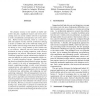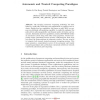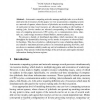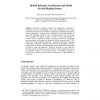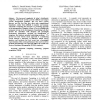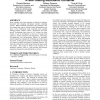157
click to vote
CNSR
2005
IEEE
15 years 4 months ago
2005
IEEE
The dramatic increase in the number of mobile subscribers has put a significant resource and service provisioning strain on current cellular networks in particular in terms of mu...
132
click to vote
ATC
2006
Springer
15 years 4 months ago
2006
Springer
The emerging autonomic computing technology has been hailed by world-wide researchers and professionals in academia and industry. Besides four key capabilities, well known as self-...
140
click to vote
AICCSA
2005
IEEE
15 years 4 months ago
2005
IEEE
Autonomic Computing was introduced to reduce the complexity of managing computing systems; however, the heterogeneous nature existing in most computing systems introduces some dif...
156
Voted
ATC
2008
Springer
15 years 4 months ago
2008
Springer
To overcome the rising complexity of computing systems, the paradigms of Autonomic Computing and Organic Computing have been introduced. By using an observer/controller architectur...
138
click to vote
EURONGI
2006
Springer
15 years 6 months ago
2006
Springer
Abstract. Autonomic computing networks manage multiple tasks over a distributed network of resources. In this paper, we view an autonomic computing system as a network of queues, w...
107
click to vote
DEXAW
2004
IEEE
15 years 6 months ago
2004
IEEE
The overall goal of this research is to improve the `environment awareness' aspect of personal autonomic computing. Personal Computing offers unique challenges for self-manag...
136
Voted
APNOMS
2006
Springer
15 years 6 months ago
2006
Springer
Distributed computing systems are continuously increasing in complexity and cost of managing, and system management tasks require significantly higher levels of autonomic managemen...
123
click to vote
ICAS
2009
IEEE
15 years 6 months ago
2009
IEEE
The increased complexity of today's distributed, composite, Web-based systems presents difficult and unique systems management problems. The way these systems interact, and th...
ACMSE
2007
ACM
15 years 6 months ago
2007
ACM
Many strategies have been proposed to address the problems associated with managing increasingly complex computing systems. IBM's Autonomic Computing (AC) paradigm is one suc...
7
posts
with
1022
views
1022
views
 Homepage
Homepage 